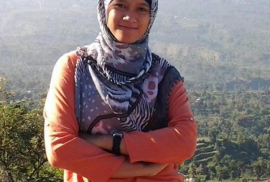Lufti Gita Iriani, the young generation of Kulon Progo Regency who was born on April 14, 1993. In 2010, began studying at the Gadjah Mada University Vocational School with a concentration in the field of Remote Sensing and Geographic Information Systems. During the study period, the desire arises to continue to a higher level of education, also encouraged by the increasing demand for educational needs in the labor market and opinions of people who underestimate D3 graduates. By following her conscience and ambition, Gita continued her studies at the Muhammadiyah University of Surakarta in 2013 with a concentration in Geography.
2018
Fathiyya Ulfa, the second daughter of three children, all of whom were born in the city of Bukittinggi, West Sumatra. Growing up in a Minang family that is thick with wandering traditions, making Ulfa has aspired to travel around the world. Unlike his age at that time, who called all kinds of professions as a place to dedicate life later. Little Ulfa in his own way has drawn a map of his life’s purpose, becoming someone who really knows what he wants. For him, the purpose of life is to live that goal through action. When we dream of traveling around a giant globe, every small step must incise results that narrow the diameter of the earth that has not been traced.
This study examines the vulnerability of paddy fields to Cidurian watershed in Renged Village, Binuang District, Serang Regency, Banten Province. Renged village was chosen as the location of the research area, because there are two factors in the economic condition of the population, the majority of which work as farmers and the geographical location of the research area is located downstream of the Cidurian watershed and 0-2% slope. The results of interviews with local communities flooding in the study area occurred every year in the rainy season, with the largest flood events in the last 20 years occurred in 1994, 2001, and 2013. Based on this, the rice fields in the study area are vulnerable to Cidurian watershed flooding. Vulnerability analysis of rice paddy fields in the study area with landforms and community perception approaches, for vulnerability assessment based on an indicator approach with coring methods and weighting scenarios. Flood hazard analysis based on parameters of depth, duration, and re-flood period.



